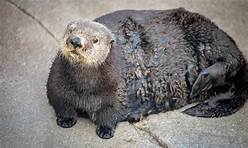Can Sea Otters Be Pets?
Sea otters are incredibly adorable creatures with a playful and mischievous demeanor. Their charming antics can quickly capture the hearts of many. However, despite their captivating presence, sea otters are wild animals with specific needs and behaviors that make them unsuitable as household pets.

Reasons Why Sea Otters Cannot Be Pets
1. Wild Instincts and Behavior:
Sea otters are wild animals with a strong instinct to live in their natural habitat. They are highly social creatures that thrive in groups called "rafts" in the ocean. Their complex social behaviors, such as foraging for food, grooming, and communicating through vocalizations, are best suited for their wild environment.
2. Specialized Diet:
Sea otters have a highly specialized diet consisting of marine invertebrates, such as sea urchins, abalones, clams, and mussels. Replicating their natural diet in a captive environment is nearly impossible, and attempting to do so can result in nutritional deficiencies and health problems.
3. Unique Aquatic Habitat:
Sea otters are adapted to a marine environment and spend most of their time in the water. They rely on their dense fur and webbed feet to navigate through the ocean, forage for food, and avoid predators. Providing them with an adequate aquatic habitat in a domestic setting is impractical and would severely compromise their well-being.
4. Legal and Ethical Considerations:
In many countries, keeping sea otters as pets is illegal or strictly regulated. Wild animals, including sea otters, face unique challenges and stresses when removed from their natural environment and forced to adapt to captivity. Ethical concerns surround the practice of taking animals from their natural habitat and subjecting them to a life devoid of their natural behaviors and social interactions.
Conclusion
While sea otters may appear endearing and tempting as pets, their unique needs, specialized diet, and wild instincts make them unsuitable companions for a household environment. Their well-being and survival are best served when they remain in their natural habitat, where they can engage in their natural behaviors and live among their own kind.
Declaration: All article resources on this website, unless otherwise specified or labeled, are collected from online resources. If the content on this website infringes on the legitimate rights and interests of the original author, you can contact this website to delete it.





